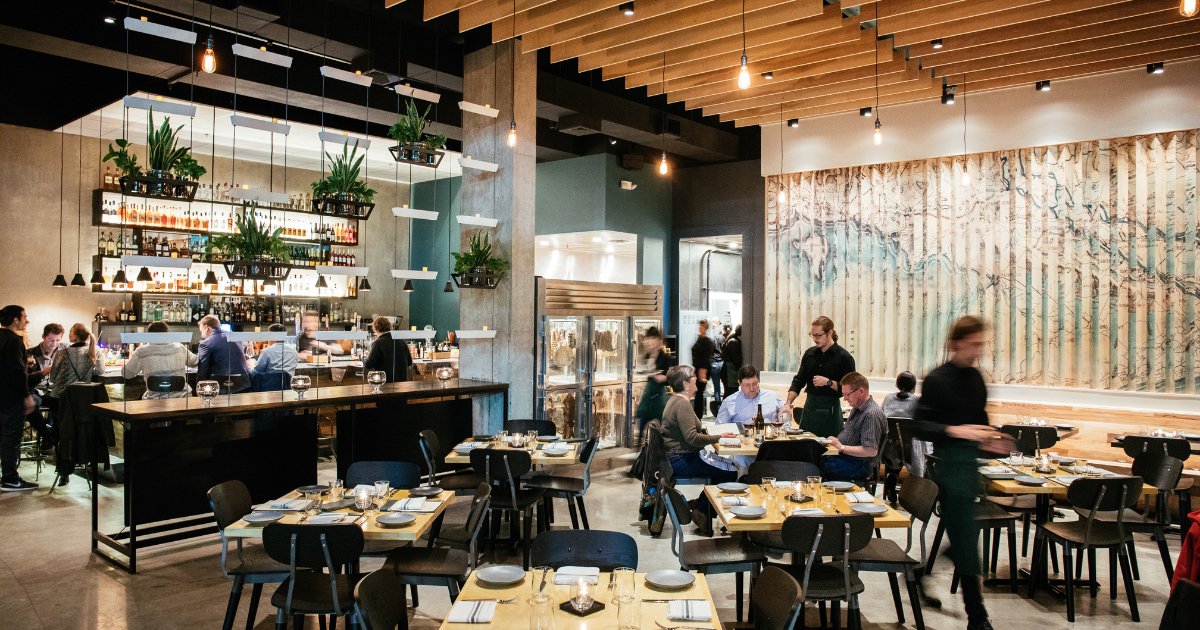We love dining at restaurants for the sense of escape they offer—a brief reprieve from everything happening beyond the walls. Attentive waitstaff make us feel special; a new napkin materializes whenever yours falls to the floor; the bartender smiles and pours a glass of whatever takes the edge off; food appears and remaining dishes get whisked away.
A quiet sort of irony belies the restaurant model. Behind the cushioned seats, service that puts you at ease, and platters of food flowing from the kitchen, organized chaos courses through the building. Every chef, server, and bartender hustles to maximize covers while ensuring a quality experience for each. The workers’ side of a restaurant can be fast-paced, gritty, and high-stress. Very few breaks. No guaranteed time off, especially paid. The physical demand of the job wears on the body—and it repeats daily.
The Covid-19 pandemic accelerated growing calls to change this industry standard. For some, it became a chance to step back and reassess how they could better care for the people who dedicate their careers to providing their services to others. The following four organizations have been leading the charge.
Three Initiatives Making a Difference
From the start of service to completing the last ticket, it’s go-time at a restaurant. “We come from a military-inspired system, especially if you work in fine dining,” explains Michael Gulotta, the executive chef of MOPHO and Maypop in New Orleans.
Those who struggle in the cut-throat environment get sent home. Those who don’t move up in their position—work more profitable shifts or take on more responsibility in the kitchen—however, the career path contains a double-edged sword. The in-the-trenches mindset fosters a sense of camaraderie among staff, but numerous studies show that sleep deprivation, depression, burnout, and substance abuse plague the industry. After all, finishing a stressful, exhausting shift at 1 am means that the only place to unwind with your coworkers is a bar—usually ones that are open late to cater to other F&B industry folks who need a place to commiserate.

Gulotta and other chefs started talking about the cycle. “We were seeing too many of our friends crash and burn, and it sometimes led to addiction problems or even death,” he says. The rise of social media additionally opened their eyes to the issue’s prevalence.
In 2018, a group of chefs and restaurateurs, including Gulotta, Naama Tamir, and John Vitale, along with writer Kat Kinsman, partnered with Unilever Food Solutions to start the Fair Kitchens Initiative, which advocates for restaurant owners and managers to adopt practices that promote their staff’s well-being. It prioritizes awareness of unhealthy work habits and mental health issues.
At Gulotta’s restaurants, for example, full-time employees receive health insurance. “People’s biggest question is if it covers mental health,” says Marianne Cardwell, the general manager at MOPHO—and, yes, it absolutely does.
The Fair Kitchens Initiative additionally demands a respectful work environment. “I run a please-and-thank-you kitchen, and I mean sincere please and thank you’s,” Gulotta says. “If there’s a moment in the night when I freak out on someone, I apologize afterwards.”
He also emphasizes general cordiality at his restaurants, making it a point for him and managers to check in with every employee each day.
Cardwell has worked with Gulotta since MOPHO opened in 2014. She closely monitors her staff members’ well-being, workload, and the general morale. “Burnout is so common,” she says and takes measures to respect their limits, such as closing sections of the dining room to avoid overwhelming servers, shortening MOPHO’s operating hours, and telling Gulotta when they need to close an additional day to give the staff a break.
“Yes, he’s my boss, but it’s my restaurant, too,” she says.
Gulotta keeps an open-door policy with his managers and staff, and Cardwell values that she can call him at any time to say what is or isn’t working and together, they find a solution.
“Now I’m the old guy, and I have the staff dictating to me, and I have to keep an open mind. It’s easy to think, ‘No! I had to do it this way, you should, too!’ And then be like, ‘No, Michael…’” Gulotta says.
Together, he and Cardwell keep open channels of communication between their staff and with each other. They additionally encourage employees to pursue healthy activities during their days off so that they can be rested when they return to work. Gulotta hopes that if they create a better culture that cares for and retains employees, it will start to support itself.
Chef Gulotta will join the TLP team in Charleston in June for Toast of Spoleto. Learn more about his mission to make restaurants a more sustainable place to work and sample dishes inspired by his Italian roots. Learn more here.

When tornadoes ravaged Mayfield, Kentucky, in December 2021, Gina Guthrie and her husband found themselves unexpectedly and simultaneously jobless.Guthrie’s place of work, Rita’s Café inside of the Hall Hotel, was demolished, and efforts to reopen have been thwarted by “one thing after another,” Guthrie says.
A friend suggested Guthrie apply for a CORE grant, which provides financial assistance to families of restaurant workers in crisis. Guthrie completed the straight-forward, online application process on her phone and received a Visa gift card to help cover living expenses for her family of five, which includes her three children, ages 10, 16, and 18. The card helps pay for electricity, water, and groceries. “You never plan for this type of thing to happen,” Guthrie says.

Guthrie’s situation isn’t unique. CORE (or Children of Restaurant Employees) provides immediate relief to restaurant workers affected by natural disaster, illness, injury, or death. An organization designed to benefit families is a novelty in the restaurant industry: The field, by default, isn’t exactly family-friendly—parents who work dinner hours don’t see their kids between school and bed-time. And, if a child gets sick, parents must scramble to get their shift covered in order to stay home. When it comes to crises, “it’s often the kids who are impacted the most,” says Sheila Bennett, the executive director of CORE.
When Bennett joined CORE in 2020,“[the organization] was the best kept secret in the industry.” She immediately embarked on advertising CORE’s mission and worked to provide grants in all fifty states. She reached out to everyone she knew in the industry, urging them to spread the word amongst their staff. Covid’s concurrent onset accelerated their outreach. Applicants’ main request was for help covering living expenses. Revising CORE’s online presence boosted their accessibility. They’ve added twelve languages to their web-site and launched an online application process, which made applying easier and streamlined the reviewal process.
Additionally, CORE started Operator Brand Advocate, a program that provides training for business owners and man-agers to identify employees who may benefit from CORE and refer them to the organization’s various resources. Upon accepting a case, CORE calls each applicant to learn more about their situation. From there, they tailor every grant to meet the recipient’s specific needs, factoring age, number of family members, and in medical cases, length of time for treatments and recovery. Even gas mileage to a hospital and parking fees are considered when finalizing the grants.
There’s room to grow, too—in 2021, the organization raised more than 1.5 million dollars, which allowed them to distribute grants to around 300 families throughout the country.
One day in the summer of 2021, Jacques Larson, the executive chef of Wild Olive and Obstinate Daughter in Charleston, found himself in a position that prevailed through restaurants last year: The dishwasher called out right before dinner service.
The already-overworked chef de cuisine had been at the restaurant since that morning, working a dayshift. Now, he anticipated a sixteen-hour shift in order to man the dish pit. As a last resort, Larson texted his friend Ben Ellsworth who had an app made specifically for people in Larson’s situation.
GigPro connects hospitality managers with gig workers in order to fill shifts through a simple job posting system. It also gives anyone interested in working at a particular restaurant the opportunity to work a shift on a trial basis to see if it’d be a good fit. “Ben talked me through what I needed to do, and within an hour we had a dishwasher in the restaurant,” Larson says. He’s been a GigPro user ever since.
As a chef, and later a restaurant consultant in Charleston, Ellsworth saw numerous occasions where chefs and cooks lost days off because someone called out unexpectedly. One night, when a dishwasher called out right before service, Ellsworth simultaneously received a notification that someone had just booked his Airbnb. It seemed to him that someone should be able to fill a shift as easily they could book a room.

Although he had “absolutely zero background in app development,” some friends of his set him up with a fairly rudimentary online platform where restaurant owners, chefs, and managers could post an open shift. Anyone could answer the call, come in, work a single shift, then head home—no strings attached for either party.
The app launched in 2019. The year 2020 advanced GigPro to a new level. “Charleston was in a very unique position because there were no restrictions placed on onsite dining,” Larson says. Postings for people to fill open positions exploded. “For me, it’s been the roughest two years in the industry after working in it for thirty,” Larson says. “We’ve all been really scared wondering where the relief was going to come from, but it’s great to rely on these guys.”
“We’re a company created by a group of chefs for chefs,” Ellsworth says. Through word of mouth, GigPro has expanded beyond Charleston to cities throughout the South and Ellsworth looks forward to taking it to the national level. He hopes that empowering the workforce through his app will “help chefs get to more birthday parties.”
share
trending content
-
Stirrups Restaurant Offers Fine Dining Like Nowhere Else
-
Our Summer 2024 Issue is Here!
by Erin Byers Murray -
9 Noteworthy Kentucky Restaurants | Listen
by TLP Editors -
Crafting Excellence at Carrboro Coffee Roasters
by TLP's Partners -
Rasam is the Spice of Life
by Veronica Meewes
More From In the Field
-
From Pop-Up To Brick-and-Mortar | Listen
-
The Return of the Lynnhaven Oyster | Listen
-
What’s On the Horizon for 2024
-
Sorelle: La Dolce Vita in Vogue
-
Keya and Co. Turning Sadness into Sugar





